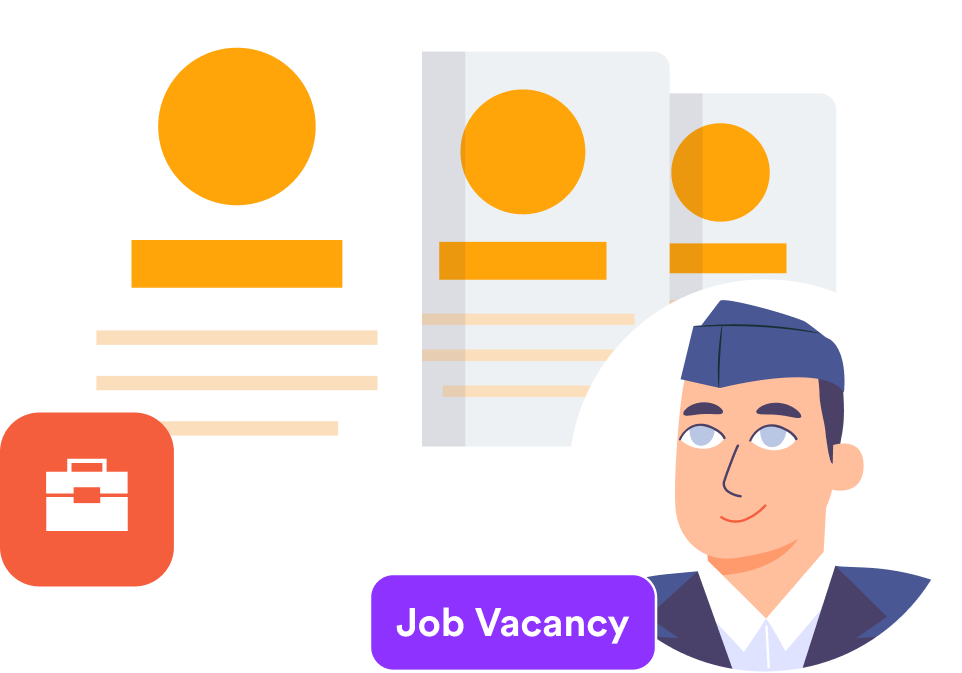Our customers have been hired by*:*Foot Note

Top Jobs for Veterans and Retired Military Members
If you’re an active duty service member preparing to leave the military, or a vet who’s already begun civilian life, many jobs are available to you. The good news is that veteran job opportunities are out there and veteran unemployment rates are dropping. In contrast to past decades, major companies are becoming more aware of the value vets (and the skill sets they’ve learned through military service) can bring to the workplace. Many even have onboarding programs specifically aimed at veterans. Add it up and it means that post-military jobs are more attractive than ever.
But finding the right veteran job isn’t always easy. A recent survey of vets determined that 70 percent of them found transition to be “challenging.” We’re here to help make the challenge (and your transition) a bit easier. Read on to learn about top professions and industries that value job candidates with military training and experiences, and use our tips to put yourself in the best position to succeed in the civilian world.
Build my resumeTop 10 Veteran Job Opportunities and Industries
1. Government positions
The federal government is the nation’s largest employer, with a wide range of jobs to choose from — everything from well-paying government technical positions to leadership roles. As a veteran, you have two major advantages over other civilian job seekers when it comes to getting a federal job:
Veterans Preference:
The government is actively looking to hire veterans, as anyone honorably discharged from the military gets preference for federal positions over many other applicants. While this doesn’t guarantee you a full-time job, it gives you a major advantage over the competition. For full details on if you’re eligible and how many “preference points” you qualify for, check out the FedsHireVets site.
Security Clearance:
Many government agencies (not to mention private businesses who work with the government) deal with sensitive information that requires security clearance to access. As a veteran, you may already have the right level of clearance to tackle these jobs, and even if you don’t, your military background is a good indicator to employers that you’re eligible for high levels of clearance. For more on security clearance eligibility, and how employers evaluate you for security clearance, see this Military.com security clearance article.
For extra help getting your resume ready for a government job, use our database of government resume examples as a foundation for your own.
2. Veteran Affairs and Administration
It’s only logical that government organizations such as the Department of Veterans Affairs can use veteran employees, so take a good hard look at employment opportunities in Veteran Affairs (VA). In addition to the advantages noted above for federal positions, veteran affairs jobs are well-suited for employees who have served in the military and understand veteran needs and challenges. Whether it’s a VA nursing job or a high-level veterans administration position, your military experience is a bonus. For more on VA jobs, visit the VA online jobs site.
3. Managerial positions
Almost every industry needs leadership skills, which means that management positions in areas such as project management, human resources, supply chain management and operations management are out there. If you’ve held a leadership position in the military or managed important projects or tasks, you’ve already exhibited many of the necessary traits to be a leader in the civilian world.
Need some inspiration to create your own resume for a manager position? View our manager resume examples.
4. Tech jobs
As high-tech industries continue to grow, the need for employees well-versed in tech is becoming more important. Jobs dealing with artificial intelligence, information technology and information security are in high demand, and fit well with veterans who have worked with electronics and tech in their military careers.
Use these technology resume samples as a guide to building your own.
5. Healthcare jobs
Like managerial jobs, healthcare jobs are in high demand, and if you’ve had healthcare responsibilities in the military, you’ve already shown you’re capable of delivering care in often stressful situations. Some popular positions for veterans include medical assistants, EMTs and paramedics.
Whether you’re looking for a medical assistant position or a top-line administrative role, we’ve got thousands of resume samples for every aspect of healthcare, from nursing to a variety of medical fields.
6. Construction
From electrician work to demolition to building new structures on short time frames, many tasks in the military match up well with construction and logistics jobs. Look for opportunities in construction planning, management and execution.
For samples you can use to create a solid resume, visit our construction resume example database.
7. Logistics
Getting from point A to point B (and bringing hundreds of service members and supplies along for the ride) is the backbone of military life. Any experience you have in transport or supply management can serve you in logistics jobs ranging from warehouse management to transportation.
Browse our logistics resume examples to get a feel for how other job seekers are crafting their resumes.
8. Police and security
Law enforcement and security jobs share a lot in common with the military, including the necessity of teamwork as well as knowledge of security procedures and weapons training. Many police officers have military experience.
Use these police resume tips and security resume examples to help create your own.
9. Aerospace
There’s a natural connection between Air Force jobs (as well as military jobs in other branches that deal with aviation) to a civilian career path in the same field. Not only do major aerospace firms need the kind of technical aeronautical and maintenance knowledge many service members develop during the military, but many are already military-friendly, as they do direct business with our defense forces. And that’s not even mentioning smaller aerospace contractors who can always use veteran expertise.
For a head-start building your aerospace job resume, see our selection of aerospace resume examples.
10. Cybersecurity
Protecting data is more important than ever, and military experience with cybersecurity translates easily to similar jobs in the private sector.
Get your cybersecurity resume up to par by using these cybersecurity resume examples as a foundation.
7 Top Tips to Prepare for the Civilian Workforce
Finding a job isn’t just about doing a job search — it’s also about putting yourself in the best position to get the job. Follow these tips to make sure that you’re ready to grab the right career opportunities when they come along.
1. Take advantage of The Transition Assistance Program (TAP)
Many service members aren’t aware that the military provides resources and courses to help you prepare for civilian life, including tips on employment and finances. TAP can start as early as a year before you leave the military, so contact your local TAP office to get started, and see this Department of Labor TAP page for more information.
2. Translate your military skills
One major challenge veterans face is translating the skills they’ve picked up in the military to a civilian job title. Let’s face it, most employers won’t know the first thing about your MOS, or the difference between a BN and a BDE, which means that it’s crucial to explain your strengths and abilities to potential employers. Use a military skills translator like that on Military.com or take a self-assessment like that offered by the VA’s Careerscope tool, and create a list of skills and achievements that helps you stand out to recruiters or hiring managers (many employers like Boeing also use military skills translators). Look up careers related to your military specialty, and emphasize skills that match up with your own. Also keep in mind that as a veteran, no matter your specialty, you have the following major skills that employers hold in high regard:
- Discipline
- Teamwork
- Strong work ethic
- Leadership
- Ability to handle pressure
- Attention to detail
- Problem-solving
- Critical thinking
- Honesty
3. Train yourself up using your GI Bill benefits
The GI Bill, which provides financial support for your education, is one of the best benefits a service member can have — and you should use it to train up on important certifications and skills that can benefit you in your civilian career. Read up on how to use your GI Bill benefits on the VA’s GI Bill site.
4. Seek out employers who value veterans
Organizations with close ties to the military (like Boeing) will always be on the lookout for veteran talent. Visit employer websites and see if they have dedicated programs for veteran hiring and career development. The more support you get in your new job, the more likely you’ll succeed.
5. Know your veteran employment rights
The government has several protections in place for service members who are starting civilian jobs, including the Americans Disabilities Act (which covers all who have served in the armed forces) and the Uniformed Services Employment and Reemployment Rights Act (USERRA), which protects veterans from discrimination. For a full rundown of these rights, see this U.S. Equal Opportunity Commission factsheet on disabled veteran rights, and the Department of Labor’s USERRA overview.
6. Get the hang of writing resumes and cover letters
Your resume (and accompanying cover letter) are the meat of any job application, and need to be at their best to impress recruiters and earn you a job interview. Use our resume templates and examples to learn how you should put together a professional resume for the specific job you want, and use our resume builder to create as many versions of your resume you need for different job opportunities, using our expert templates and advice. Likewise, use our cover letter builder, cover letter examples and tips to craft a letter that makes the right first impression on an employer.
7. Make use of your connections
It’s estimated that 70 percent of all jobs are found through networking, so take advantage of your contacts, including fellow service members and veterans. Reach out to those you know to find job opportunities on job networking sites like LinkedIn, and get the references you need to appeal to hiring managers. For more networking tips, see our Job Search Guide.
Build my resumeFAQ: How Can Veterans Find a New Career?
Have questions? We’re here to help.
How many veterans get a job after their military service?
Studies show that on average, 25 percent of all transitioning veterans have a job ready and waiting for them when they exit the military, but close to 50 percent of them immediately hit job-search mode upon leaving service. This means the vast majority of transitioning veterans out there are ready for a civilian career.
Is it easier for vets to get a new job?
The short answer: It can be a challenge, especially if you’re looking to jump-start a long-term civilian career. On average, nearly half of all veterans report that it takes longer than four months for them to find a new job after separating from the military. On top of that, nearly 50 percent of veterans have noted that they leave their first civilian job within their first year. That’s why it’s important to get started on your job search as early as possible, and take the time to research your options.
How can a veteran prepare for civilian life?
Veterans can prepare for civilian life by seeking resources like the Transition Assistance Program (TAP). This program helps service members transition from military life to civilian life by offering support and resources that educate veterans on important topics like disability compensation and health care benefits, as well as providing job search assistance. Take the time to start looking through job boards, particularly job boards that have postings geared towards veteran job seekers (such as Military.com).
What are the benefits of being a veteran?
Your civilian job search can benefit from veteran benefits such as the GI Bill, veterans preference for federal hiring, and universal vet employment protections under USERRA and the American Disabilities Act. Veterans also enjoy many other benefits, including assistance on home loans, life insurance and disability compensation, as well as several healthcare options (depending on your time in service). For a full explanation of the veterans benefits available to use, visit the VA’s Veteran Benefits page.
Couldn't find the answer you're looking for?







